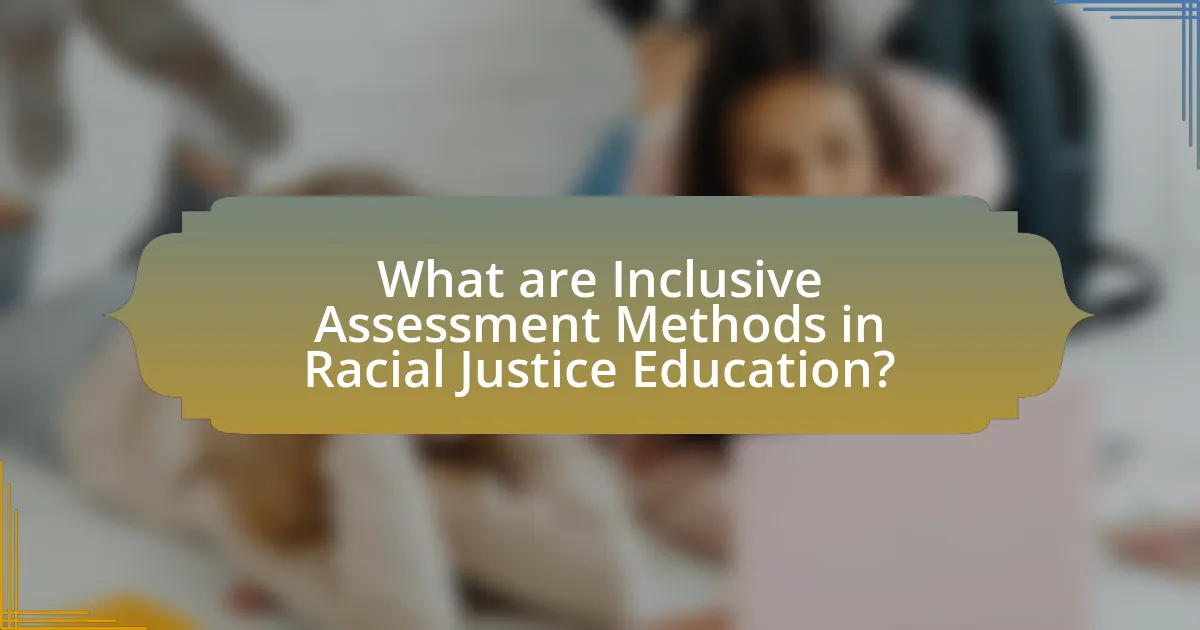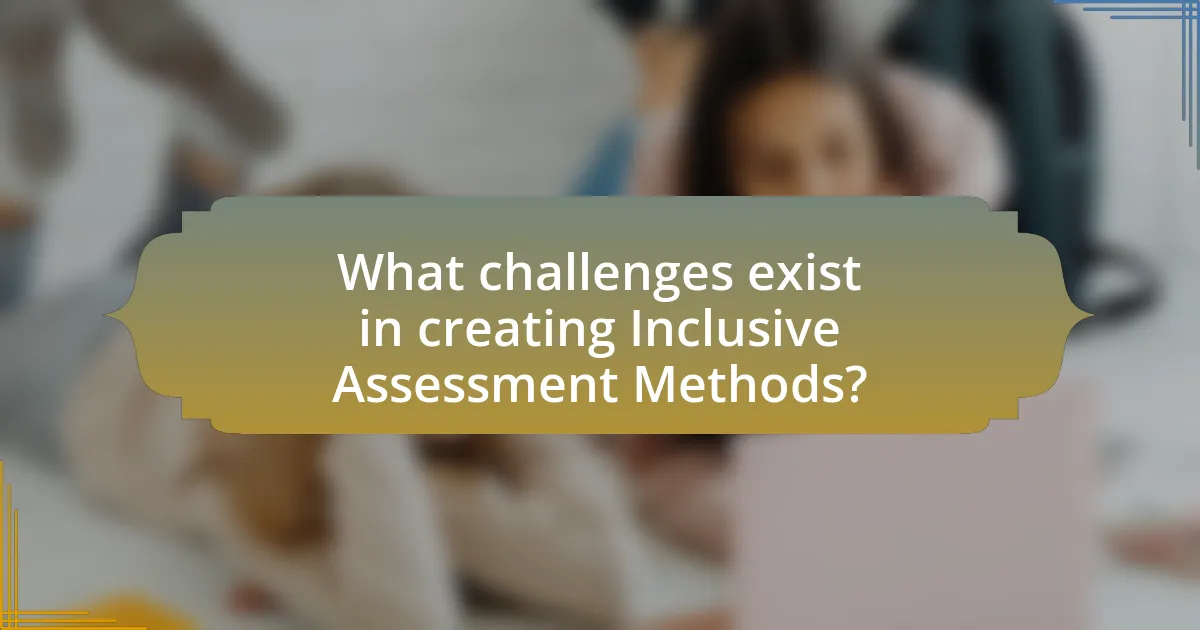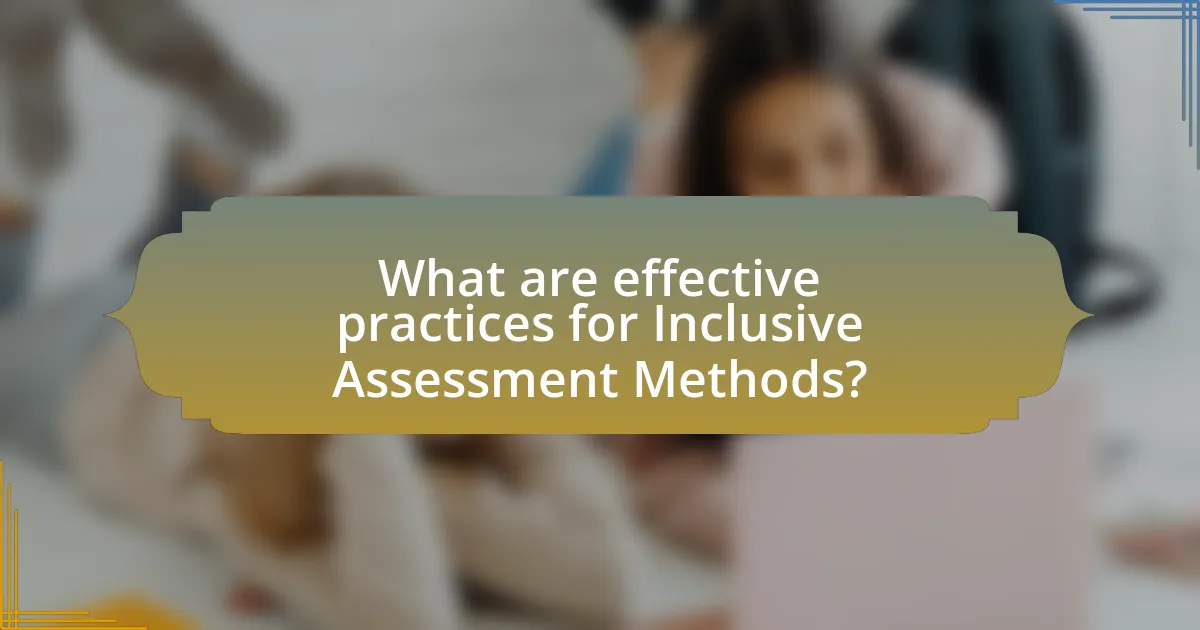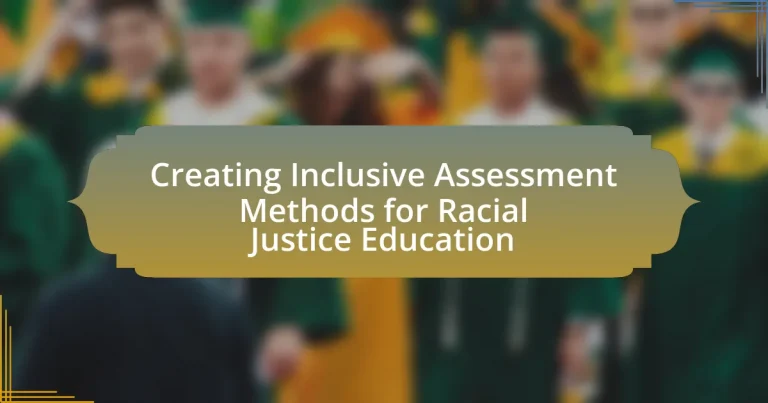The article focuses on creating inclusive assessment methods within the framework of racial justice education. It outlines various strategies that evaluate student learning while considering diverse backgrounds, emphasizing culturally responsive assessments and formative feedback. Key principles such as equity, accessibility, and cultural relevance are discussed, highlighting their role in promoting fairness and addressing systemic biases in education. The article also examines the challenges educators face in implementing these methods, the importance of student voice in assessment design, and effective practices for fostering inclusivity, ultimately aiming to enhance educational outcomes for marginalized students.

What are Inclusive Assessment Methods in Racial Justice Education?
Inclusive assessment methods in racial justice education are strategies designed to evaluate student learning while considering diverse backgrounds and experiences. These methods include culturally responsive assessments, which integrate students’ cultural contexts into evaluation processes, and formative assessments that provide ongoing feedback rather than solely relying on high-stakes testing. Research indicates that such approaches can enhance engagement and learning outcomes for marginalized students by validating their identities and experiences. For example, a study by Ladson-Billings (1995) highlights the importance of culturally relevant pedagogy in fostering academic success among students of color, demonstrating that inclusive assessments can lead to more equitable educational environments.
How do these methods promote equity in educational settings?
These methods promote equity in educational settings by ensuring that assessments are designed to be inclusive and culturally responsive. Inclusive assessment methods recognize diverse learning styles and backgrounds, allowing all students, particularly those from marginalized communities, to demonstrate their knowledge and skills effectively. Research indicates that culturally relevant assessments can lead to improved academic outcomes for underrepresented students, as they feel more valued and understood in the learning process. For instance, studies show that when assessments reflect students’ cultural contexts, engagement and performance increase, thereby reducing achievement gaps.
What principles underpin inclusive assessment methods?
Inclusive assessment methods are underpinned by principles of equity, accessibility, and cultural relevance. Equity ensures that assessments are fair and provide all students with equal opportunities to demonstrate their knowledge, regardless of their background. Accessibility involves designing assessments that accommodate diverse learning needs and preferences, allowing all students to engage meaningfully. Cultural relevance emphasizes the importance of incorporating diverse perspectives and experiences into assessments, which fosters a sense of belonging and validates students’ identities. These principles collectively support a more just and effective educational environment, particularly in the context of racial justice education.
How do these methods address systemic biases in education?
These methods address systemic biases in education by implementing inclusive assessment practices that recognize and accommodate diverse learning styles and backgrounds. For instance, culturally responsive assessments allow educators to evaluate students in ways that reflect their cultural contexts, thereby reducing the impact of bias inherent in traditional testing methods. Research indicates that when assessments are aligned with students’ cultural experiences, it leads to improved engagement and performance, as evidenced by studies showing that students from marginalized backgrounds perform better when their cultural identities are acknowledged in the assessment process.
Why is Racial Justice Education important in assessment?
Racial Justice Education is important in assessment because it ensures that evaluation methods are equitable and reflective of diverse student experiences. By integrating racial justice principles into assessment, educators can identify and address systemic biases that may disadvantage marginalized groups. Research indicates that assessments designed with racial equity in mind lead to more accurate representations of student learning and potential, as they consider cultural contexts and varied learning styles. For instance, studies show that culturally responsive assessments improve engagement and performance among students of color, highlighting the necessity of incorporating racial justice into educational evaluation frameworks.
What role does assessment play in advancing racial justice?
Assessment plays a critical role in advancing racial justice by identifying disparities in educational outcomes and informing targeted interventions. Through systematic evaluation of student performance and experiences, assessments reveal inequities that marginalized groups face, enabling educators and policymakers to address these gaps effectively. For instance, data from the National Assessment of Educational Progress (NAEP) consistently shows achievement gaps between racial groups, highlighting the need for tailored educational strategies that promote equity. By utilizing assessments to track progress and inform practices, stakeholders can create more inclusive educational environments that support racial justice initiatives.
How can assessments reflect diverse cultural perspectives?
Assessments can reflect diverse cultural perspectives by incorporating culturally relevant content, varied assessment formats, and inclusive evaluation criteria. Culturally relevant content ensures that the materials and examples used in assessments resonate with the experiences and backgrounds of diverse student populations, thereby validating their cultural identities. Varied assessment formats, such as oral presentations, group projects, and creative assignments, allow students to demonstrate their knowledge and skills in ways that align with their cultural strengths. Inclusive evaluation criteria that recognize different cultural expressions and learning styles further ensure that assessments are fair and equitable. Research indicates that culturally responsive assessments can improve student engagement and achievement, as evidenced by studies showing that students perform better when their cultural backgrounds are acknowledged in educational settings.

What challenges exist in creating Inclusive Assessment Methods?
Creating inclusive assessment methods faces several challenges, including bias in assessment design, lack of resources, and insufficient training for educators. Bias can manifest in the form of culturally insensitive questions or evaluation criteria that do not account for diverse backgrounds, which can disadvantage certain student groups. Additionally, many educational institutions may lack the necessary resources, such as time and funding, to develop and implement inclusive assessments effectively. Furthermore, educators often receive inadequate training on how to create and apply these methods, leading to inconsistencies in assessment practices. These challenges hinder the goal of equitable education and assessment for all students.
What barriers do educators face in implementing these methods?
Educators face several barriers in implementing inclusive assessment methods for racial justice education, primarily including lack of training, insufficient resources, and systemic biases. Lack of training limits educators’ understanding of culturally responsive pedagogy, which is essential for creating equitable assessments. Insufficient resources, such as access to diverse materials and technology, hinder the ability to develop and implement these methods effectively. Additionally, systemic biases within educational institutions can perpetuate inequities, making it challenging for educators to adopt inclusive practices. These barriers collectively impede the progress toward equitable assessment in education.
How can institutional policies hinder inclusive assessments?
Institutional policies can hinder inclusive assessments by enforcing rigid standards that do not accommodate diverse learning needs. These policies often prioritize uniformity over flexibility, which can marginalize students from various backgrounds, particularly those with disabilities or different cultural experiences. For instance, standardized testing requirements may not reflect the knowledge or skills of all students, leading to inequitable outcomes. Research indicates that such policies can perpetuate systemic inequalities in education, as they fail to recognize and address the unique challenges faced by underrepresented groups.
What misconceptions about racial justice education affect assessments?
Misconceptions about racial justice education that affect assessments include the belief that such education is solely about guilt or blame, which can lead to resistance from educators and students. This misconception undermines the goal of fostering understanding and critical thinking about systemic inequalities. Additionally, the idea that racial justice education is only relevant to specific subjects or demographics can result in a lack of integration across curricula, limiting the effectiveness of assessments designed to measure understanding of these issues. Research indicates that inclusive assessment methods, which consider diverse perspectives and experiences, are essential for accurately evaluating student learning in this area.
How can educators overcome these challenges?
Educators can overcome challenges in creating inclusive assessment methods for racial justice education by implementing culturally responsive assessment practices. These practices involve recognizing and valuing the diverse cultural backgrounds of students, which enhances engagement and relevance in assessments. Research indicates that culturally responsive assessments lead to improved student performance and motivation, as they reflect students’ lived experiences and knowledge. For instance, a study by Ladson-Billings (1994) highlights that incorporating students’ cultural contexts into assessments fosters a more equitable learning environment. By utilizing varied assessment formats, such as project-based assessments and collaborative group work, educators can also accommodate different learning styles and reduce bias, further promoting inclusivity.
What strategies can be employed to foster inclusivity in assessments?
To foster inclusivity in assessments, educators can implement diverse assessment formats, such as project-based assessments, oral presentations, and portfolios, which accommodate various learning styles and backgrounds. Research indicates that using multiple assessment methods allows students to demonstrate their knowledge in ways that align with their strengths, thereby reducing bias and promoting equity. For instance, a study by the National Center for Fair & Open Testing highlights that varied assessment types can lead to improved student engagement and performance, particularly among marginalized groups. Additionally, incorporating culturally relevant content into assessments ensures that all students see their experiences reflected, further enhancing inclusivity.
How can collaboration among educators enhance assessment practices?
Collaboration among educators enhances assessment practices by fostering diverse perspectives and shared expertise, which leads to more comprehensive and equitable evaluation methods. When educators work together, they can develop assessments that reflect a broader range of student experiences and learning styles, ensuring that all students are fairly evaluated. Research indicates that collaborative assessment design can improve reliability and validity, as seen in studies where teams of teachers created common assessments that better aligned with learning objectives and student needs. This collaborative approach not only improves the quality of assessments but also promotes professional development among educators, as they learn from each other’s insights and strategies.

What are effective practices for Inclusive Assessment Methods?
Effective practices for inclusive assessment methods include utilizing diverse assessment formats, providing multiple means of demonstrating knowledge, and ensuring accessibility for all learners. Diverse formats, such as projects, presentations, and written assignments, cater to different learning styles and backgrounds, promoting equity in assessment. Providing multiple means of demonstrating knowledge allows students to showcase their understanding in ways that align with their strengths, which is supported by Universal Design for Learning principles. Ensuring accessibility involves adapting assessments to meet the needs of students with disabilities, as mandated by the Americans with Disabilities Act, which requires educational institutions to provide equal opportunities for all students. These practices collectively foster an inclusive environment that supports racial justice education by recognizing and valuing the diverse experiences and perspectives of all learners.
How can assessments be designed to be culturally responsive?
Assessments can be designed to be culturally responsive by incorporating diverse cultural perspectives and experiences into the assessment content and format. This involves using materials that reflect the backgrounds of all students, ensuring that questions are relevant to their lived experiences, and allowing for multiple forms of expression in responses. Research indicates that culturally responsive assessments can improve student engagement and performance, as they validate students’ identities and promote equity in educational outcomes. For example, a study by Gay (2010) highlights that culturally relevant pedagogy enhances student achievement by connecting learning to students’ cultural contexts.
What types of assessment formats support inclusivity?
Assessment formats that support inclusivity include diverse methods such as open-ended questions, project-based assessments, and collaborative group work. These formats allow for varied expression of knowledge and skills, accommodating different learning styles and backgrounds. Research indicates that using multiple assessment formats can enhance engagement and provide equitable opportunities for all students to demonstrate their understanding, as highlighted in studies on differentiated instruction and culturally responsive teaching.
How can feedback mechanisms be improved for diverse learners?
Feedback mechanisms can be improved for diverse learners by incorporating culturally responsive practices and personalized feedback strategies. Culturally responsive feedback acknowledges the diverse backgrounds of learners, ensuring that feedback is relevant and respectful of their cultural contexts. Personalized feedback strategies, such as adaptive learning technologies, allow for tailored responses that meet individual learning needs, enhancing engagement and understanding. Research indicates that when feedback is aligned with students’ cultural experiences and learning preferences, it leads to improved academic outcomes and greater motivation (Gay, 2010, “Culturally Responsive Teaching: Theory, Research, and Practice”).
What role does student voice play in assessment design?
Student voice plays a crucial role in assessment design by ensuring that assessments are relevant, equitable, and reflective of diverse student experiences. Incorporating student perspectives allows educators to create assessments that not only measure knowledge but also resonate with students’ cultural backgrounds and lived experiences. Research indicates that when students are involved in the assessment process, it leads to increased engagement and motivation, as well as improved learning outcomes. For instance, a study by the Center for Research on Education Outcomes found that student involvement in assessment design can enhance academic performance and foster a sense of ownership over their learning.
How can student input shape more equitable assessments?
Student input can shape more equitable assessments by incorporating diverse perspectives and experiences into the evaluation process. Engaging students in the design of assessments allows educators to understand the varied backgrounds and learning styles of their students, which can lead to more relevant and fair evaluation criteria. Research indicates that when students contribute to assessment frameworks, it enhances their ownership of learning and promotes a sense of belonging, ultimately leading to improved academic outcomes. For instance, a study by the University of California found that student involvement in assessment design resulted in a 20% increase in student satisfaction and perceived fairness in evaluations.
What methods can be used to gather student feedback effectively?
Surveys and questionnaires are effective methods to gather student feedback. These tools allow educators to collect quantitative and qualitative data on student experiences and perceptions. Research indicates that well-structured surveys can yield high response rates, especially when they are anonymous, which encourages honesty and openness (Dillman, Smyth, & Christian, 2014). Additionally, focus groups provide a platform for in-depth discussions, enabling students to express their thoughts in a collaborative environment. This method can uncover nuanced insights that surveys may miss. Furthermore, informal feedback mechanisms, such as suggestion boxes or digital platforms, facilitate ongoing dialogue and immediate responses, enhancing the feedback loop.
What are some best practices for implementing inclusive assessments?
Best practices for implementing inclusive assessments include designing assessments that accommodate diverse learning styles and backgrounds, ensuring accessibility for all students, and incorporating multiple forms of assessment to capture a range of student abilities. Research indicates that assessments should be flexible, allowing for varied responses and formats, such as projects, presentations, and traditional tests, to reflect students’ strengths. Additionally, providing clear instructions and criteria can help all students understand expectations, while regular feedback fosters a supportive learning environment. These practices align with educational equity principles, promoting fairness and inclusivity in assessment processes.
How can educators continuously evaluate and improve their assessment methods?
Educators can continuously evaluate and improve their assessment methods by implementing regular feedback mechanisms, analyzing student performance data, and engaging in professional development. Regular feedback from students allows educators to identify areas of confusion and adjust their assessments accordingly. Analyzing performance data helps educators understand trends and gaps in student learning, enabling targeted improvements. Additionally, participating in professional development focused on inclusive assessment practices equips educators with new strategies and insights, fostering a culture of continuous improvement. Research indicates that formative assessments, which provide ongoing feedback, significantly enhance student learning outcomes, supporting the need for educators to adopt such methods.
What resources are available to support inclusive assessment practices?
Resources available to support inclusive assessment practices include guidelines from educational organizations, assessment tools designed for diverse learners, and professional development programs focused on equity in education. The National Center for Fair & Open Testing provides resources that emphasize fairness in assessments, while the Universal Design for Learning framework offers strategies to create assessments that accommodate various learning needs. Additionally, the Assessment Institute offers workshops and materials that focus on inclusive assessment practices, ensuring that all students, regardless of background, can demonstrate their knowledge effectively. These resources are validated by research indicating that inclusive assessment practices lead to improved educational outcomes for marginalized groups.


